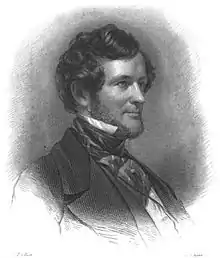Lewis Gaylord Clark
Lewis Gaylord Clark (October 5, 1808 – November 3, 1873[1]) was an American magazine editor and publisher.

Biography
Clark was born in Otisco, New York in 1808.[2] He had a twin brother, poet Willis Gaylord Clark.[3]
Career
He succeeded Charles Fenno Hoffman as editor and publisher of The Knickerbocker magazine, a role he held for over 25 years (1834–1861).[4] By 1840, it had become the most influential literary publication of the time in the United States,[2] especially through the contributions from such writers as Washington Irving, William Cullen Bryant, Nathaniel Parker Willis, and Henry Wadsworth Longfellow, and by Clark's own departments, the "Editors Table" and "Gossip with Readers and Correspondents". Pecuniary distress caused its discontinuance, and Clark removed to Piermont, New York, where he lived in a residence presented by former contributors to his magazine, who raised the necessary funds in part by publishing a volume of their contributions, under the title The Knickerbocker Gallery. He published the Knickerbocker Sketch-Book (1850), including some of his own essays, and Knick-Knacks from an Editor's Table (1852). In retirement, after the magazine folded, Clark regularly contributed articles to the Evening Post and the Home Journal.[5]
During his career, Clark made an enemy of fellow editor and author Edgar Allan Poe. The two traded insults in their respective magazines.[6]
References
- Author and Bookinfo.com
- Miller, Perry. The Raven and the Whale: The War of Words and Wits in the Era of Poe and Melville. New York: Harvest Book, 1956: 12.
- "Willis Gaylord Clark - Willis Gaylord Clark Poems - Poem Hunter". www.poemhunter.com.
- Miller, Perry. The Raven and the Whale: The War of Words and Wits in the Era of Poe and Melville. New York: Harvest Book, 1956: 11–12.
- "OBITUARY.; LEWIS GAYLORD CLARK". The New York Times.
- Moss, Sidney P. "Poe and his Nemesis--Lewis Gaylord Clark" in American Literature, Vol. 28, No. 1 (Mar., 1956), pp. 30-49
- This article incorporates text from a publication now in the public domain: Gilman, D. C.; Peck, H. T.; Colby, F. M., eds. (1905). New International Encyclopedia (1st ed.). New York: Dodd, Mead.
{{cite encyclopedia}}: Missing or empty|title=(help)